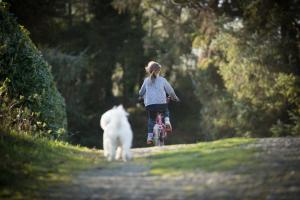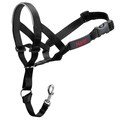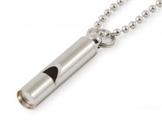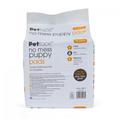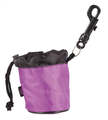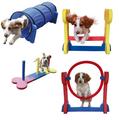As we start to see the light at the end of the long covid tunnel and ease ourselves back into our busy, bustling lives, it's time to revisit the topic of socialisation and how we can help our dogs adjust back to normal life. For puppies and younger dogs that may never have experienced life without COVID, you'll probably be all too aware of the importance of supporting them in meeting new people, new dogs and feeling comfortable in busy and unfamiliar surroundings.
For older dogs:
Dogs that were well socialised before lockdown will probably cope quite well when life returns to normal, providing introductions are made gradually and not all at once.
For the last year or more, your dog has seen fewer faces, experienced less social activity and general hubbub, and played with fewer dogs in the park. They've gotten used to spending time solely with you, their immediate family, in the safe and quiet confines of the home, where the pace of life is slower and generally more relaxed.
Now, as restrictions are lifting and life is regaining its usual momentum, you may find your dog getting anxious or overly excited, in a way they never were before.
This is to be expected and can be easily managed providing the pace is gradual. Taking your dog to the park and letting them off-lead around other dogs may be too much too soon, and may result in some naughty behaviours. Similarly, approaching other dogs on lead while you stop and have a chat with the owners is also likely to cause over-excitement and even frustrated on-leash behaviours.
Try one-on-one playdates at first, preferrably in a garden where both animals are contained and in a more relaxed and familiar setting. Reward calm and obedient behaviour and pay close attention to your dog's general mood and body language.
As they become used to the presence of other people again, you may start to think about heading out, either to a pub garden for a drink or a busier public space to run errands. Only take your dog if you are confident the experience won't be too stressful and you can continue to meet their needs while on-the-go. If heading to a pub garden, for example, take a soft blanket for your dog to lie down on in the shade, as well as some toys and distraction aids to keep them entertained and comfortable. Giving a calming supplement like SettleMe may also help take the edge off their anxiety.
Keep these periods short at first until your dog is well adjusted, then you can think about doing more and for longer periods at a time.
For younger dogs and puppies:
If you got a new puppy during lockdown, then the usual methods of socialisation wouldn't have been possible. Puppy classes are essential for a dog's development and sociability and meeting new people when out and about would usually be a great way of getting them used to new interactions. Of course with COVID, none of this has been allowed to happen.
As things start to open up again and more meetings are possible, try to involve your dog as much as you can, but don't rush it, as your dog is new to the social butterfly lifestyle. Aim to keep interactions short and distanced to help your dog build its confidence around new people. Stick to one-on-one playdates rather than big groups of dogs, and continue daily neighbourhood walks to familiarise your dog with all the different sights, scents and sounds.
When puppy classes are permitted again, take your dog along! They really are a great investment and most puppies purchased during the pandemic will still be of an age to really benefit from them. Hopefully your dog will already be making great strides with its training having spent so much time with you over the last year, so classes are a great way to build on this and make further progress, with the added excitement of meeting new friends and faces too!
Written by: Hannah
